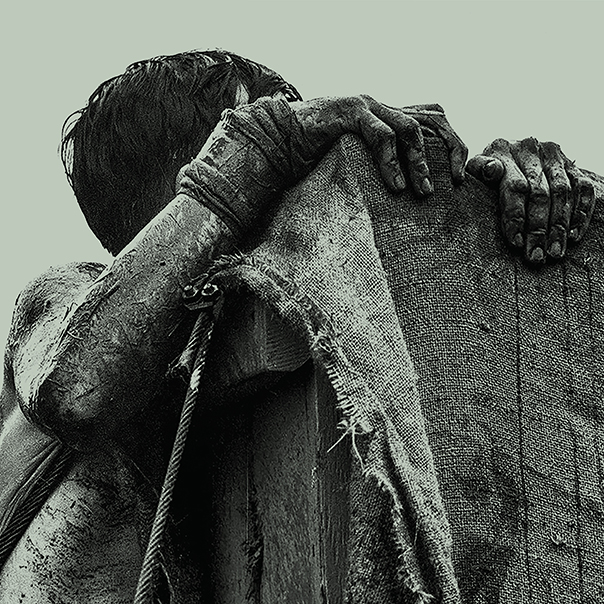ALBUM REVIEW: METZ expands dysphoric territory on ‘Atlas Vending’

It’s hard to imagine anyone would need extra stress in times like these. Yet it’s a gamble METZ is willing to take. Since 2008, the noise-punk trio has honed its high-pressure sound to a serrated edge. The band’s guitar-driven compositions have existed at the margins of meltdown, filled with tension, seldom resolving.
Atlas Vending
METZ
Sub Pop, Oct. 9
8/10
With Atlas Vending, METZ loses none of its intensity. Pummeling rhythms butt up against violent, slashing guitar playing. Forceful atonal choruses anchor the songs. METZ’s saturated yet no-frills attack still rages with migraine-inducing ferocity. Alex Edkins rips bloody incantations from his ragged throat, and his obsessive derangement takes the wheel. Brief trance-like passages reduce the acceleration, but nothing on this record soothes. The band engineers a system that equilibrates at reactivity.
But the noise dystopia explored on Atlas Vending is not achieved merely by increasing the entropy of the system, and that is why it generally works. METZ seems to have increased its dynamic range since 2017’s Steve-Albini-produced Strange Peace. On that album, the band worked in a concise, punchy format, paying homage to Big Black and AmRep in equal measure. Songs were structurally straightforward, built around shouted phrases and dissonant guitar hooks.
Atlas Vending, in contrast, sounds more developed. METZ builds up elements of atmosphere not evident before. Prior to Atlas Vending, the band’s most intense concepts were realized through linear and unrelenting tactics. Here, a dimension of halting complexity augments the gnarl of their punk bile. In addition to boxy pub-industrial anthems, listeners are treated to post-traumatic expositions unfolding in brief, mood-shifting chapters.
“Blind Youth Industrial Park” seethes with in-your-face attitude, but it’s also haunted by something desolate and deranged. “I know exactly what you’re thinking, I know exactly who you are,” Edkins accuses, as resigned backing vocalists shrug with antipathy. A tough chorus rings with cynicism and sincerity. The song is simultaneously friendly and standoffish, with emphasis on the latter. The band can hardly conceal its indignation in the face of a sick world.
“Framed By The Comet’s Tail” follows a similar course, deriving increased value from the slowed-down parts. Dysphoric passivity oppresses a long middle section. When the band pours in some extra juice for the payoff, a surprising warmth underpins the song’s flanged urgency. The song expires abruptly, leaving a subtle but distinctly bitter taste.
Influences assert themselves robustly. METZ provides a salient jumping-off point for abrasive ’90s emo bands like Fugazi and Drive Like Jehu. This can present an obstacle to METZ’s emerging voice, as the similarities are striking on record. Edkins’ rasp furnishes bleak commentary from the grimy gutters of the mix, all but drowned in the guitar clangor. One longs for the live performance, with all its pathos and sweat.
Energy meets and marginally accepts introspection on Atlas Vending. Suffering is better than boredom as METZ kicks from travesty to junk pile. On “The Mirror” the band throws in some major thirds to brighten things up, but it doesn’t come easily. Heavy triplets from drummer Hayden Menzies drive swarming guitar pestilence from Edkins. Nail-biting mosh portions incite layers of lancing vocals. At last, an almost-catchy chorus fights its way out of the wiry guitar murk, approaching exaltation.
The morbidly titled “A Boat To Drown In” does little to elevate spirits. A meditative drone belies the overdriven one-note riff that pushes the song forward. Edkins’ modern, fragmented verse churns along in a state of sustained anxiety. Compared to the tormented paranoia that guides METZ’s aesthetic, it’s a mellow entry. Compared to absolute mellow, it is nerve-shatteringly hellacious.
In other words, METZ’s painful dissonance is slightly mitigated by craggy choruses and stark slow-downs. But it never becomes boneheaded metal-core, being too much indebted to art-school post-punk. “Hail Taxi” exemplifies the album well. It begins with one of the nastiest derailments of the album. But METZ journeys around its spectrum, from semi-melodic choruses to Chris Slorach’s stoic bass, and back to screeching dissonance. It’s the type of song that by its very unlikeliness might just end up on repeat in listeners’ heads.
On Atlas Vending, METZ tracks the sound of collapse with devolving songs and reckless performances. Ranging from cynical to post-apocalyptic, the concepts harbor no relief. METZ convincingly scrounges rat-like in inhospitable territory. A place of illness, cold, and bleak survivalism, the band’s turf is not for the meek.
